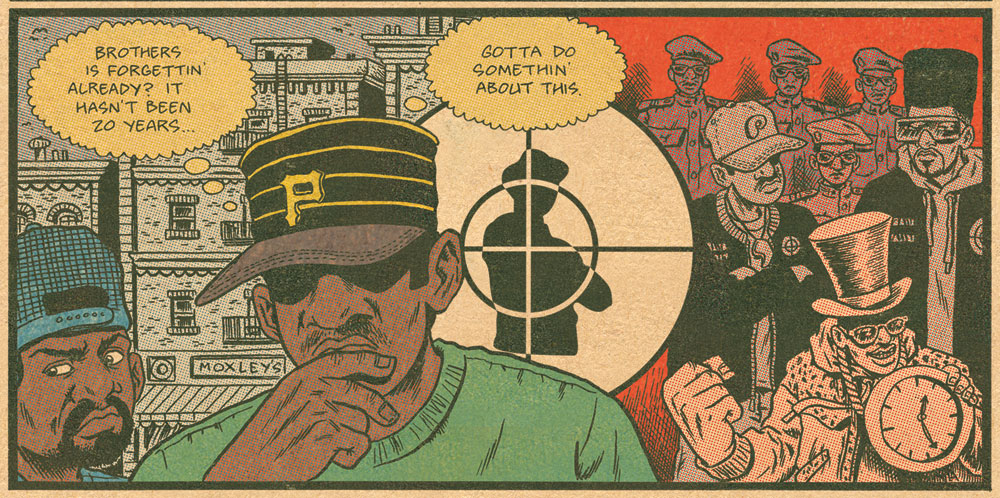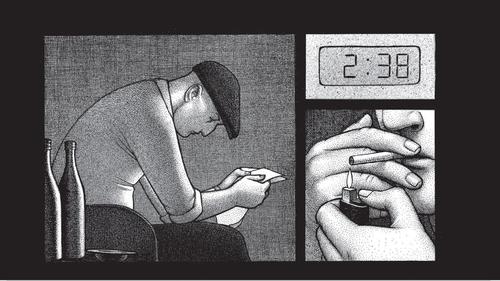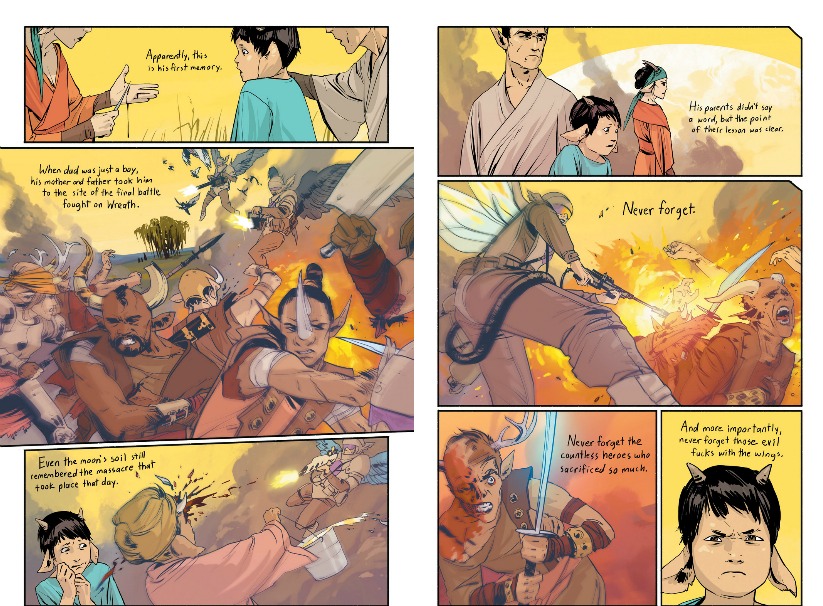Scott McCloud Selects the Best American Comics 2014
Each year since 2006, the publisher Houghton Mifflin Harcourt has released an edition of the
Best American Comics series, a best-of collection similar to the
Best American Short Stories and
Best American Non-required Reading. Each volume has been edited (i.e. selected) by a comic book luminary. Past editors include Harvey Pekar, Neil Gaiman, Chris Ware, Alison Bechdel, and Jeff Smith, who edited
the 2013 edition. The
Best American Comics 2014 was edited by Scott McCloud, creator of comics that explain the comic form such as
Understanding Comics and
Making Comics. Here he has also put together one of the best editions of the
Best American Comics series yet.
[caption id="" align="aligncenter" width="541"]

From Ed Piskor's "Hip Hop Family Tree"[/caption]
The best thing about
Best American Comics 2014 is the breadth of McCloud’s choices. The name “Best American” usually feels like a marketing gimmick, but looking through the comics in
Best American Comics 2014, this is actually a pretty strong representation of comics in that year (these comics were originally published from late 2012 to mid-2013). I haven’t counted number of selections, but McCloud seems to include more comics than previous years’ editions. Consequently, many of the inclusions are pretty short – though they’re long enough to get a sense of the work.
In many “best of” lists or anthologies, there is the risk that the person selecting will give us simply a list of familiar creators. Not only are these lists probably not all inclusive of the best work done, but they are also not helpful for fans wanting to discover new work. McCloud includes both “old favorites” and promising new creators in
Best American Comics 2014. Familiar names like Charles Burns, Adrian Tomine, Jaime and Gilbert Hernandez (separate entries), R. Crumb, Tom Hart, and Chris Ware make appearances. However, McCloud also selects up-and-coming creators like Michael DeForge, Ed Piskor, Sam Sharpe, and Brandon Graham.
[caption id="" align="aligncenter" width="506"]

From Richard Thompson's "Cul De Sac"[/caption]
McCloud’s inclusiveness can be found in other areas, as well. Especially surprising is that McCloud also has a number of “avant garde” creators like Onsmith, Erin Curry, and Victor Cayro. I was not very familiar with most of these artists – and at times their selections really pushes the limits of what can be considered “comics” – but the work is really interesting if you approach it with an open mind. McCloud is fair to comic books on the other side, as well – mainstream comics. He includes a segment from an issue of
Saga by Brian K. Vaughan and Fiona Staples and wanted to include an excerpt from Marvel Comics’
Hawkeye by Matt Fraction and David Aja, though a legal issue prevented it (I imagine this is a money/residuals issue).
I’ve often thought that previous editors of the
Best American Comics series did themselves a disservice by excluding not only superhero comics published by Marvel and DC, but also non superhero comics published by DC’s Vertigo imprint, Image, Dark Horse, and other companies. There have been little to none of these included in the
Best American Comics prior to the 2014 edition, so hopefully McCloud’s inclusion means that other future editors will cast a wider net in choosing what is worthy of consideration for the
Best American Comics anthologies.
[caption id="" align="aligncenter" width="528"]

From Nina Bunjevac's "August 1977"[/caption]
It’s true that as with any “best of” list, there are choices that could be debated. There are some works in the
Best American Comics 2014 that I don’t think are worthy of selections. They range from legend R. Crumb to little-known Sam Alden. However, that is simply the nature of collections or lists like this. I will say that the majority of the works in the book are very strong, so it’s hard to quibble too much with McCloud’s choices. Clearly, the
Best American Comics series tends to select cartoonists (who do both the writing and art), but there are some other entries that defy that convention.
Perhaps the most unlikeable thing about the
Best American Comics 2014 book is how much McCloud inserts himself into it. He has grouped selections together in sections, and he writes an introduction for each section that while usually informative often talks more about Scott McCloud than the work in that section. He also makes a big deal about reading the book in order, in order to preserve his groupings. It’s almost like McCloud has the sense that this is some sort of mixtape that will be ruined if you don’t read it in the order he imagined. That’s pretty ridiculous because I did not find the groupings to be especially helpful, revelatory, or necessary. Directly refusing McCloud’s edict, I say that it is totally fine to browse and not read
Best American Comics 2014 in his prescribed order.
[caption id="" align="aligncenter" width="522"]

From Brian K. Vaughan and Fiona Staples' "Saga"[/caption]
At the same time, I don’t want to slag McCloud too much because the annoyance of his groupings really doesn’t diminish the work in
Best American Comics 2014. It’s actually very easy to ignore the groupings altogether. Also, McCloud does deserve high praise for bringing together what I feel is the most diverse and best collection of comics ever presented in the
Best American Comics series. It’s very difficult to know exactly what you’ll get in one of these collections, but I think
Best American Comics 2014 is a book that is really worth checking out if you are curious about the range and depth of creative comic work being created today.
 From Ed Piskor's "Hip Hop Family Tree"[/caption]
The best thing about Best American Comics 2014 is the breadth of McCloud’s choices. The name “Best American” usually feels like a marketing gimmick, but looking through the comics in Best American Comics 2014, this is actually a pretty strong representation of comics in that year (these comics were originally published from late 2012 to mid-2013). I haven’t counted number of selections, but McCloud seems to include more comics than previous years’ editions. Consequently, many of the inclusions are pretty short – though they’re long enough to get a sense of the work.
In many “best of” lists or anthologies, there is the risk that the person selecting will give us simply a list of familiar creators. Not only are these lists probably not all inclusive of the best work done, but they are also not helpful for fans wanting to discover new work. McCloud includes both “old favorites” and promising new creators in Best American Comics 2014. Familiar names like Charles Burns, Adrian Tomine, Jaime and Gilbert Hernandez (separate entries), R. Crumb, Tom Hart, and Chris Ware make appearances. However, McCloud also selects up-and-coming creators like Michael DeForge, Ed Piskor, Sam Sharpe, and Brandon Graham.
[caption id="" align="aligncenter" width="506"]
From Ed Piskor's "Hip Hop Family Tree"[/caption]
The best thing about Best American Comics 2014 is the breadth of McCloud’s choices. The name “Best American” usually feels like a marketing gimmick, but looking through the comics in Best American Comics 2014, this is actually a pretty strong representation of comics in that year (these comics were originally published from late 2012 to mid-2013). I haven’t counted number of selections, but McCloud seems to include more comics than previous years’ editions. Consequently, many of the inclusions are pretty short – though they’re long enough to get a sense of the work.
In many “best of” lists or anthologies, there is the risk that the person selecting will give us simply a list of familiar creators. Not only are these lists probably not all inclusive of the best work done, but they are also not helpful for fans wanting to discover new work. McCloud includes both “old favorites” and promising new creators in Best American Comics 2014. Familiar names like Charles Burns, Adrian Tomine, Jaime and Gilbert Hernandez (separate entries), R. Crumb, Tom Hart, and Chris Ware make appearances. However, McCloud also selects up-and-coming creators like Michael DeForge, Ed Piskor, Sam Sharpe, and Brandon Graham.
[caption id="" align="aligncenter" width="506"] From Richard Thompson's "Cul De Sac"[/caption]
McCloud’s inclusiveness can be found in other areas, as well. Especially surprising is that McCloud also has a number of “avant garde” creators like Onsmith, Erin Curry, and Victor Cayro. I was not very familiar with most of these artists – and at times their selections really pushes the limits of what can be considered “comics” – but the work is really interesting if you approach it with an open mind. McCloud is fair to comic books on the other side, as well – mainstream comics. He includes a segment from an issue of Saga by Brian K. Vaughan and Fiona Staples and wanted to include an excerpt from Marvel Comics’ Hawkeye by Matt Fraction and David Aja, though a legal issue prevented it (I imagine this is a money/residuals issue).
I’ve often thought that previous editors of the Best American Comics series did themselves a disservice by excluding not only superhero comics published by Marvel and DC, but also non superhero comics published by DC’s Vertigo imprint, Image, Dark Horse, and other companies. There have been little to none of these included in the Best American Comics prior to the 2014 edition, so hopefully McCloud’s inclusion means that other future editors will cast a wider net in choosing what is worthy of consideration for the Best American Comics anthologies.
[caption id="" align="aligncenter" width="528"]
From Richard Thompson's "Cul De Sac"[/caption]
McCloud’s inclusiveness can be found in other areas, as well. Especially surprising is that McCloud also has a number of “avant garde” creators like Onsmith, Erin Curry, and Victor Cayro. I was not very familiar with most of these artists – and at times their selections really pushes the limits of what can be considered “comics” – but the work is really interesting if you approach it with an open mind. McCloud is fair to comic books on the other side, as well – mainstream comics. He includes a segment from an issue of Saga by Brian K. Vaughan and Fiona Staples and wanted to include an excerpt from Marvel Comics’ Hawkeye by Matt Fraction and David Aja, though a legal issue prevented it (I imagine this is a money/residuals issue).
I’ve often thought that previous editors of the Best American Comics series did themselves a disservice by excluding not only superhero comics published by Marvel and DC, but also non superhero comics published by DC’s Vertigo imprint, Image, Dark Horse, and other companies. There have been little to none of these included in the Best American Comics prior to the 2014 edition, so hopefully McCloud’s inclusion means that other future editors will cast a wider net in choosing what is worthy of consideration for the Best American Comics anthologies.
[caption id="" align="aligncenter" width="528"] From Brian K. Vaughan and Fiona Staples' "Saga"[/caption]
At the same time, I don’t want to slag McCloud too much because the annoyance of his groupings really doesn’t diminish the work in Best American Comics 2014. It’s actually very easy to ignore the groupings altogether. Also, McCloud does deserve high praise for bringing together what I feel is the most diverse and best collection of comics ever presented in the Best American Comics series. It’s very difficult to know exactly what you’ll get in one of these collections, but I think Best American Comics 2014 is a book that is really worth checking out if you are curious about the range and depth of creative comic work being created today.
From Brian K. Vaughan and Fiona Staples' "Saga"[/caption]
At the same time, I don’t want to slag McCloud too much because the annoyance of his groupings really doesn’t diminish the work in Best American Comics 2014. It’s actually very easy to ignore the groupings altogether. Also, McCloud does deserve high praise for bringing together what I feel is the most diverse and best collection of comics ever presented in the Best American Comics series. It’s very difficult to know exactly what you’ll get in one of these collections, but I think Best American Comics 2014 is a book that is really worth checking out if you are curious about the range and depth of creative comic work being created today.